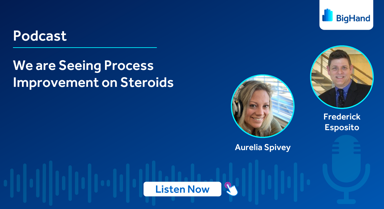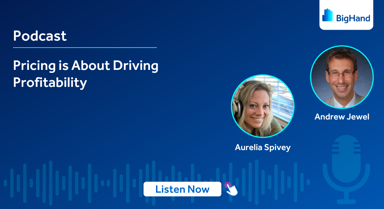Podcast Transcript:
Michael Katz
Sometimes we financial folks emphasize our profit hat and our gatekeeper hat. But to be successful, I think we really have to wear more of our marketing hat.
Aurelia Spivey
Welcome to Pricing Matters, a podcast by Digitory Legal. Digitory is a data analytics and cost management platform and service, bringing data-driven pricing and cost prediction to law. My name is Aurelia Spivey, and I will be your host as we speak to leaders who are making an impact in legal pricing, discuss market trends, and find out from them why pricing matters.
Good morning. Welcome to the Pricing Matters podcast. Our guest today is Michael Katz. Michael is the Pricing & Data Analytics Director at Holland & Knight. Welcome, Michael.
Michael Katz
Pleasure speaking with you.
Aurelia Spivey
I think it's always helpful for our listeners that we start with a little bit about your background. I'd love for you to tell us a little bit about your pricing journey.
Michael Katz
Certainly, I like to tell people that I'm one of the oldest and youngest in the field. Since chronologically, I believe I'm the only pricing director who is eligible for Social Security, and I'm also probably the only one who never had a full-time pricing responsibility in a prior job. So how did I get here, I spent most of my career actually working at a publishing company McGraw-Hill, which was a very highly financially driven firm, where business managers had a lot of input into how decisions were made, supporting a general manager. That's what I did through a series of financial positions, working for various publishing units and also for the head of the information technology function. Having that experience, working with the general manager, is really important in developing your business smarts. I followed a McGraw-Hill manager to the law firm industry and have worked mostly in areas of treasury and financial analysis for WilmerHale and for Orrick. At Orrick, I was mostly concerned with growth through lateral and acquisitions of practices, most notably having worked on the Dewey Ballantine merger for about a year, and also having worked on our international expansion. So how did I get to pricing? I was very interested in pricing, I saw it as a really growing field and something that I could do because I've developed that kind of solutions orientation at McGraw-Hill, and the ability to work with general managers and senior partners, and in general having developed a deep understanding of how law firms operate through working for CFOs and COOs at a couple of different firms.
Aurelia Spivey
Michael, thanks for sharing that. When we were preparing for this interview, you laid out your sort of approach to dealing with partners that law firms. I'd love you to share what you call the consulting approach with our listeners.
Michael Katz
Certainly, so it's pretty basic, but having been in a position where I had to really start up the pricing function at my firm. My major concern was having a favorable interaction with the partners so that they in turn would recommend me to other partners. So to do that, what I call a consulting approach, was first always preparing well before having an interaction with a partner, which means checking a partner's overall statistics, looking at some of their key clients, in addition to the ones that they might want to have mentioned as being the topic they wanted to talk about, but always looking at the background of that one client in advance. I always tried to work the telephone versus email. You very often get an email, with a very specific question, and that to me engenders just return emails and an email trail, and not too much exploration of alternatives. I just find being on the phone to be much more productive than email. When you're on the phone, then you can start approaching the partner and really trying to expand the conversation. The most valuable piece of information I learned was from a very successful Mary Kay lady, who sold cosmetics to lawyers, who told me that, never try to really sell them anything. I take that approach with pricing, where I try to ask non-threatening open-ended questions that hopefully will lead the partner to a good solution. I say a good solution because I find that they really sell them the best solution. It's very useful to offer a client a couple of different solutions anyway. If my goal is to have a favorable interaction with a partner, it's always good to start with what they had in mind, perhaps change it somewhat to make it better, but the goal isn't the best, the goal is to make that partner a return customer. Yeah, and it's been relatively successful, where I have a cadre of about 50 good customers among our partners. I'd like to have more, but there's plenty of work in supporting those.
Aurelia Spivey
I'd love to know from you as well, what trends are you seeing from clients at the moment? What are they asking for most?
Michael Katz
Probably similar to most of my peers, we spend a lot of time looking at RFPs. We're seeing much more specific questions in terms of technology solutions and legal process management. Again, like many of my peers, those are difficult questions, because we don't have the branded solution that some other law firms have. So, to answer questions like that, I really have to do some exploration and keep abreast of the efforts that we have in those areas that aren't firm solutions. However, they are solutions that apply to a particular practice group, office, or even a particular partner that can be cited to show that we are making efforts in those areas.
Aurelia Spivey
Yeah, I think clients are definitely getting a lot more detailed in their RFPs and I think it's helpful to think, beyond, think what you're actually doing in your practice and be able to showcase that. I think that's really helpful for people to think about. Obviously, you've got a lot of experience in fee arrangements and I think it's really helpful to hear, what do you think are the characteristics of the most successful fee arrangements that you've seen?
Michael Katz
Yeah, it's really two things I would point out. The first is to have a simple fee arrangement. That means absorbing some potential risk, but it also helps in terms of fostering the client relationship. I don't think clients want to be bothered with too many kinds of adjustments or something that they need to really think about more than, say, every half a year or so. That said, I would always include some sort of adjustment mechanism in a fee arrangement, whether it's a fixed fee arrangement or a collar arrangement. Where there may or may not be something already built into the arrangement, but you always should be able to revisit it after six months or a year to see that it's still working for both sides.
Aurelia Spivey
Excellent. I think we've heard that as well. I think the sort of continued collaboration that we're hearing in the industry does lend itself to that. Keep it simple and remain flexible, I love that. So it's also helpful to talk about pricing teams. We know that your function is growing in importance at law firms. I'd love to know a little bit about your team at Holland & Knight and what advice do you have for pricing teams. What should they be prioritizing to be successful?
Michael Katz
I have a relatively small department, given the fact that we have over 1200 lawyers, and so the team consists of myself and two staff members. One staff member has deep firm knowledge, having worked in the business intake function of the firm for over 10 years, and the second staff member is very skillful in terms of computer skills, especially being able to use Power BI, as well as very advanced Excel skills. It's really great having that combination. I think the other thing that I look for in the staff is having business smarts and, again, what I would call a solutions orientation. We have to produce for our partners, they need RFPs and pitches with pricing provisions that will win the business. I think keeping that in the forefront is very important. sometimes we financial folks emphasize our profit hat and our gatekeeper hat. But to be successful, I think we really have to wear more of our marketing hat.
Aurelia Spivey
Fantastic. That's really an interesting approach. Would you, can you delve in a little bit for me on the marketing hat and how your team approaches that set at Holland & Knight?
Michael Katz
One of the first open-ended questions I tend to ask partners is, who else is bidding on this work? And it actually is amazing that very often that they won't know and they'll have to ask the question. That really starts a whole chain of different possibilities in terms of the pricing model. Of course, we also collect as much information as we can on our competitor's pricing, and especially very specific kinds of questions coming with information, coming from lateral partners, coming from other firms, to try to understand in a particular situation what are the real relevant competitive rates that we're facing?
Aurelia Spivey
You've talked about your two different team members coming in sort of from two different spheres. So I think that's pretty common. Pricing professionals that I've spoken to, do come from a variety of backgrounds. So I'd love to know from you a little more about what you think the most important skills are for this role in general.
Michael Katz
Yeah, I would come back to business smarts, sometimes called commercial acumen. I saw an interesting maturity model from Clio this morning, which talks about how firms succeed in the pricing arena and really as effective business partners or clients. Their model is very simple, you create a high client experience, a very favorable client experience, and you perform, and I think that applies to individuals as well. You want to satisfy your internal clients, who are your partners, and you want to perform by producing a quality work product, something that they feel confident in supporting.
Aurelia Spivey
You also spoke a little bit about, throughout our conversation, your solutions orientation. I'd love it if you can give a bit more of a definition of what you mean by that for our listeners because I think that's going to be a helpful way of thinking about things.
Michael Katz
It is pretty fundamental that you want to give the partner an answer to his problem. We as pricing, people tend to fill in the gaps in terms of the organizational structure, where partners will come to us with problems that aren't really officially pricing or even a client-related problem, but we always try to do whatever is needed. I recall a matter where a partner needed to take a very complex spreadsheet that had been developed by PWC and to make changes in it so that they could assess the potential damages. Our response was, oh, this is a tough Excel spreadsheet problem, it's not really related to what we do, but yeah, we'll do that for you. Simply because we have the ability, we have the skill, and we should do it. Another case was where a client, a partner came to us because he needed a special loan amortization schedule. And again, that's not something that's usually within our charter, but it's something he needed, and there was really nobody else in finance to do it. So I would just point to those things, in terms of serving our partners well.
Aurelia Spivey
Yeah, I think it's so important to be able to support the business and if you've got the skill set in your team, given all of this, obviously, we all have challenges in business. So I'd love to know what the greatest challenges are for, in your opinion, pricing professionals. How you and your team are overcoming them?
Michael Katz
Well, I have to say that, I think there's a big challenge in trying to sell the function. I'm constantly trying to find ways to do that. I think like many of my peers, we do presentations at partner luncheons, we do presentations at practice group meetings or lawyer meetings, and we have a monthly tip on our intranet site. All of this is designed to help drive partners to see us and to consult with us when they have a need. It's sometimes a bit frustrating because we like to think that we have the answers to a lot of problems, but it's, I think, largely a question of just maintaining our efforts. Lately, on our daily intranet site, there's often an article about a legal success for clients, and so for the past six months or so. We've also talked about the financials for that legal success story, at least to mention the fact that it was a significant matter in terms of fees and hopefully, to talk about the fact that it was well staffed from a leverage perspective and, and highly profitable. But we keep trying to find ways of engaging our partners. We've had a few successes in terms of sending our partners for education off-site, basically through some of the organizations that we maintain membership in, True Value Partnering Institute, and LawVision. So again, we always keep looking forward to getting that engagement.
Aurelia Spivey
You know you're not alone, but I think it's a great tip, in terms of. I've worked in law firms and I've obviously seen those deals that have been published and I think it's really great to keep adding to that, the financial piece, and I think that's a top tip for listeners. If that's appearing on their internet, put your pricing perspective, get the pricing perspective on that. I think people will enjoy that and take that away. We just did a podcast about the TVPI conference, so I think there are some great resources and they were very encouraging to bring the people in your firm to parts of that event. So I think the more education the better.
So, this is the Pricing Matters podcast, so I always like to end with this question. So Michael, tell me, why does pricing matter to you?
Michael Katz
Well, again, having had a number of jobs, I have to honestly say that this pricing job is actually the most interesting job of my career. What I like about it is having a pretty immediate kind of feedback. When I deal with a partner, they're pretty quick about saying, oh, yeah, that's a good idea. They're also pretty quick about saying, oh, maybe there's something else that you could have told me or whatever. So again, I like having the feedback and especially like it when my good ideas are thought to be good by the client as well.
Aurelia Spivey
That's excellent. Well, I'm having spoken to a few pricing professionals now on this podcast, and every time I asked that question, I think, gee, maybe I should have had a job in pricing in law firms because everyone does seem to love their job.
Well, thank you so much for taking part in this conversation and sharing your insights with others.
Thank you for listening to Pricing Matters, a podcast Digitory Legal. To find out more about our guests please visit our podcast page. If you have any feedback or guests that you think we should feature, please reach out to me. Thank you for listening, see you next time.






